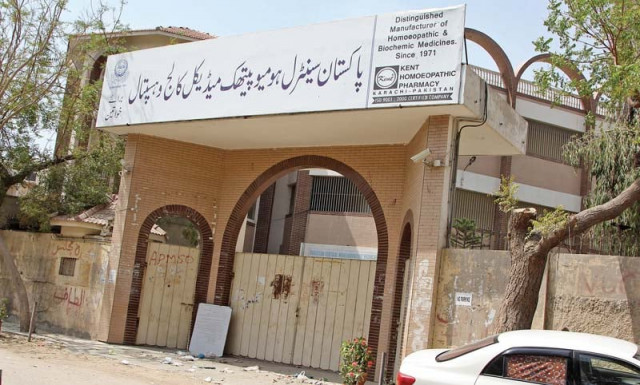Get a four-year homeopathy diploma for only Rs52,000
Dr Qazi lamented that there is no homeopathic medical college owned by the government in the entire country

Pakistan Central Homeopathic College was established in 1951. PHOTO: AYSHA SALEEM/EXPRESS
With private universities charging exorbitant amounts for bestowing a higher education degree on you, the first homeopathic college of the city is offering a four-year diploma in the field just for Rs52,000.
Established in 1951, the Pakistan Central Homeopathic Medical College (PCHMC) is run by an elected governing body of homeopaths of Karachi. It is situated in Nazimabad, next to Karachi Metropolitan Corporation's (KMC) homeopathic hospital and a market for homeopathic medicines.
‘SIUT is a model for developing countries’
According to the principal of the boys' campus, Dr Mukhtar Ahmed, the average annual fee of the Diploma in Homeopathic Medicine Surgery (DHMS) is Rs13,000, which makes the four-year degree cost Rs52,000. He said that the only source of funds for the college is the tuition fee of the students.
There are 200 seats each for boys and girls allocated by the National Council for Homeopathy, said Dr Mukhtar. However, he said that hardly 70% of the quota for boys is fulfilled, while there is 100% enrolment in the girls' section of the college.
The secretary of the college's governing body, Dr Qazi Waseem Ahmad, said that enrolment in the boys' campus has dropped due to the change of rules by the National Council for Homeopathy. Earlier, arts students could also apply for the course but currently only science students with a minimum qualification of Matric can apply.
The PCHMC is one of those institutes whose need was felt soon after Partition to establish an institution for the development, education and research in the field of homeopathy, Dr Qazi told The Express Tribune. He pointed at the group photo hanging in his office and said Fatima Jinnah was the chief guest at the first convocation in 1956.
According to Dr Qazi, the college had a single campus for boys and girls until 1971, when the National Council for Homeopathy directed the college administration to conduct classes in the morning shift only. Since then, the campus was divided to accommodate the boys and girls separately.
SIUT celebrates 40 years of free medical treatment
Currently, two principals and separate staff for boys' and girls' sections are running the college with a single governing body. The general body of 50 homeopaths elects the governing body, which also runs a homeopathic dispensary and gynaecological centre within the premises. The land for the KMC's homeopathic hospital was also provided by the then administration of the college in 1983. The entire facilities are spread over 2.5 acres.
Dr Mukhtar said students have to study specialised courses like homeopathic philosophy and Homeopathic Materia Medica in their four-year DHMS, which is awarded by the National Council for Homeopathy.
Dr Qazi lamented that there is no homeopathic medical college owned by the government in the entire country when homeopathy is the second most popular method of treatment across the world. He said that homeopathic medical science is recognised as one of the systems of medicine by the government but has never been promoted at the government level as an alternative healthcare method to provide skilful and trained homeopaths.
Rangers' abode
Meanwhile, the boys' campus of PCHMC has become home to Sindh Rangers. Commenting on the presence of Rangers in the campus, Dr Mukhtar Ahmed said, "They don't get involved in our day-to-day matters and reside temporarily on the upper two floors of the building."
Published in The Express Tribune, March 31st, 2016.


















COMMENTS
Comments are moderated and generally will be posted if they are on-topic and not abusive.
For more information, please see our Comments FAQ